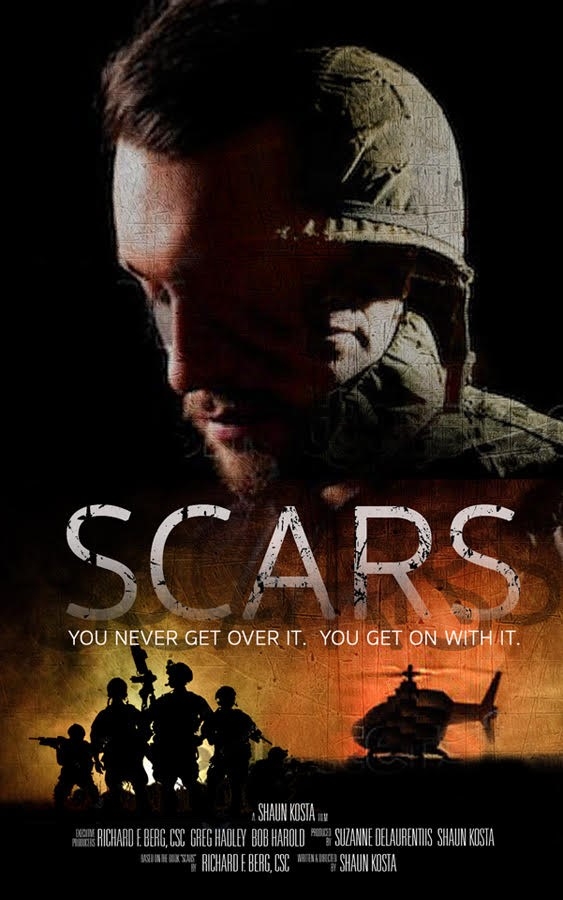WINTER 2024
Light to Hidden Suffering
Fr. Richard Berg’s book—Scars: The Effects of Post-Traumatic Stress on Family, Relationships, and Work—has been adapted into a feature film.
- Story by Jessica Murphy Moo
 SCARS STARTED WITH an invitation. In 2012, a physician invited Fr. Berg to meet with some of the active military being treated for PTSD at Cedar Hills Hospital in Portland. Fr. Berg, as is his habit, accepted the invitation.
SCARS STARTED WITH an invitation. In 2012, a physician invited Fr. Berg to meet with some of the active military being treated for PTSD at Cedar Hills Hospital in Portland. Fr. Berg, as is his habit, accepted the invitation.
Fr. Berg, CSC, ’54, ’69 was well-suited for this assignment. Though he is officially retired from his scholarly work in psychology—he earned his PhD in this field and was the dean of UP’s College of Arts and Sciences for thirteen years—he has a clinical understanding of trauma and the brain.
He met with nine men. He says he sat with them not as a scholar or a priest, but as a listener. He didn’t wear his Roman collar. “I didn’t want that to be an obstacle,” he says. “Sometimes as a priest, you’re seen as a role, not a person.”
He felt it was an immense privilege to hear their stories. And he had a new appreciation for “how traumatic hidden suffering is.” He started to wonder if there might be a way to use their stories to help others who struggle with PTSD. He asked these men for their permission—keeping identities and specifics confidential—to use elements of their experiences in a work of fiction. The goal, he hoped, would be “to help people cope.”
They agreed. And he wrote a story about an army medic named Eric, who is sent to Afghanistan, where he experiences some of the brutal horrors of war. He has battlefield experience. He loses friends. Someone he is trying to heal spits at him. And he starts to have nightmares and guilt. Eric’s mother and girlfriend, who are at home keeping the family vineyard (barely) afloat and hoping for his safe return, are also characters in the book. When Eric returns, they struggle to find ways to support and understand him. Eric starts drinking, he contemplates suicide, and struggles to find his purpose outside of a war zone. He has family, therapeutic, and spiritual supports at the ready, though, for a time, he pushes them away.
At UP in 2018, Scars was adapted into a therapy play, where scripts are read by people (not actors) in clinical settings. Someone might read any number of the roles—say, the spouse might read the role of the soldier and vice versa in order to help with understanding, walking in the other person’s shoes, speaking their feelings out loud.
Now—with the support of University of Portland; Suzanne DeLaurentiis Productions; many friends and supporters of The SCARS Project nonprofit that Fr. Berg founded; and writer and director Shaun Kosta—Scars is also movie. Plans for a Los Angeles premiere are in the works.
Fr. Berg didn’t expect any of this— and he certainly didn’t expect the cameo he has in the film—but he keeps saying “yes” to these invitations if he feels there is some way it might be a comfort and support to people. Looking back at his career, you can see that this lovely man has a “yes” habit. This was how he became a very young religious superior here in Oregon decades ago, why he simultaneously served as dean at UP and pastor of the St. Andre Bessette Downtown Chapel, and why he started the Maybelle Center, the first Medicaid-only assisted living residence of its kind when it was founded.
This fall there was an early viewing of the film at Mary’s Woods, the retirement community where he has been serving as chaplain for more than twenty years. The hall was packed. There are a lot of people pulling for this project, and hoping for the potential it might have to support people.
Even during the filming in Hollywood, Fr. Berg said actors and members of the film crew approached him to say how the work had been a help to them. (The company they worked with intentionally hires veterans.) After the screening at Mary’s Woods, he heard not only from veterans in the room, but also from spouses who had been among those waiting at home and trying to support. They said they felt seen.
In his post-script in the book, Fr. Berg writes, “Wounds may heal; scars last a lifetime.” He hopes that Scars will help encourage others to share their stories and to find ways to live with the invisible scar of PTSD.
We’ll keep you posted on the premiere, though in the meantime it’s available on Prime. We’re also crossing our fingers we can screen it at University of Portland and celebrate Fr. Berg and his holy work.